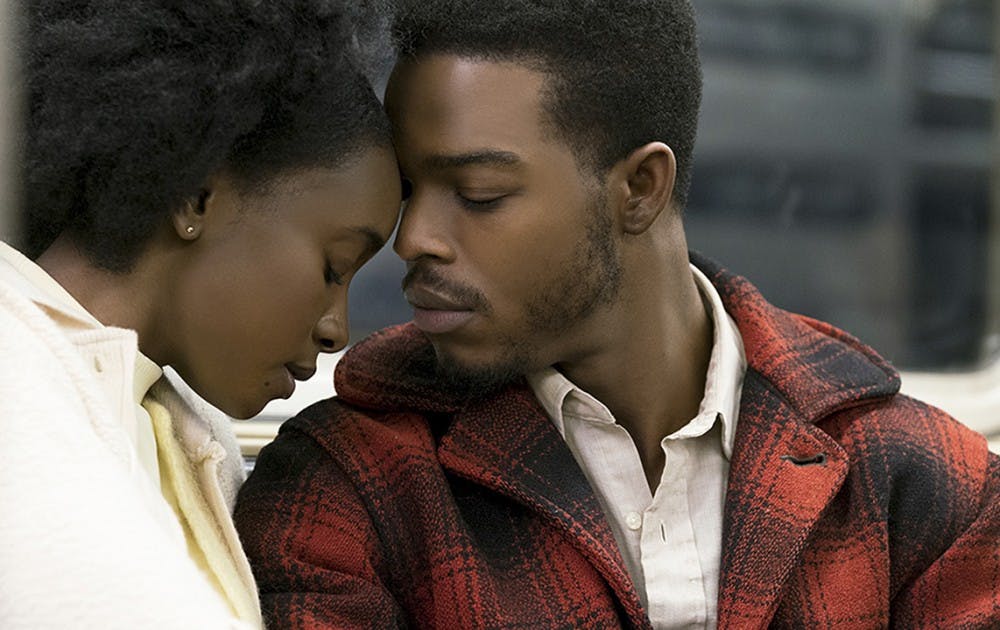Movie: “If Beale Street Could Talk”'
Release Date: Dec. 25, 2018
Director: Barry Jenkins
Run Time: 1 hour 59 minutes
Rating: A+
Since emerging into the mainstream two years ago with the groundbreaking film “Moonlight,” 39-year-old director Barry Jenkins has been surrounded with a lot of hype. After all, “Moonlight” won the Oscar for Best Picture in 2017, so there's no surprise that his follow-up film had a lot to live up to.
However, it seems that time and time again, if an artist’s work is critically acclaimed, the public demands that the artist top it. While this is a normal response, sometimes the pressure becomes too much to handle. As a result, some artists burn out or their next work fails miserably. And when this happens, the public becomes bored and the artist loses their grace. Fame is a fickle thing that has proven to be a vicious cycle, but luckily for us, Jenkins hasn’t succumbed to the pressure. Instead, he has crafted his second masterpiece.
“Love brought you here. If you trusted love this far, don’t panic now,” says Sharon Rivers (Regina King) to her pregnant daughter Tish (KiKi Layne) as she lays in bed, uncertain of the road that lies ahead of her and the father of her child.
Based on the 1974 novel by prolific African-American author James Baldwin, “If Beale Street Could Talk” is set in 1970s Harlem and follows the story of a young black couple who falls in love in a society that was never meant for them to succeed. And by society, I mean America.
Tish Rivers (KiKi Layne) and Alonzo ‘Fonny’ Hunt (Stephan James) have known each other all their lives, so it would make sense that the stars have aligned for them to be together. However, the American justice system is determined to pull them apart. After Fonny is falsely accused of raping a mother of three by a racist police officer, he is jailed, and Tish is in a race against time to prove his innocence. Throughout the film, their situation becomes even more desperate as Tish learns that she is expecting Fonny’s child.
The film is narrated by the 19-year-old Tish, as a she recounts to the audience how she and Fonny fell in love and the pinnacles of their relationship thus far. Her narration is everything that a black 19-year-old woman growing up in the '70s should be: acutely aware of the injustices that surround her, yet somewhat hopeful for a better future regardless.
While Tish and Fonny's romance seems more grounded in reality than something like the manufactured Hollywood love story in the $200 million “Titanic,” the young couple's arc remains one of epic proportions. Jenkins' fluid camerawork and attention to detail can attest to this.
Through his interpretation of Baldwin’s work, less is more as Jenkins illustrates that it’s the small things that matter. Simple acts such as the way Fonny’s hands always seem to find Tish’s, or the longing looks the couple gives each other when they think the other isn’t looking show this. Jenkins and his crew make seemingly mundane tasks such as making dinner for a significant other or taking a stroll through the park feel like so much more, as many scenes are paired with warm hues, a sweeping orchestral score and beautiful performances by the two leads and the rest of the supporting cast.
The story is given in two doses that gives audiences the taste of the good and the bad that occurs in the couple's tumultuous journey. At moments when you find yourself at dinner with the couple or at their home listening to records, Jenkins juxtaposes those memories against stark images of a black family at the mercy of the hands of a justice system that was never meant to protect nor serve them.
In many ways, the racism that surrounds Fonny’s imprisonment mirrors the society we live in today, nearly 50 years after Baldwin’s novel was originally published. Jenkins handles the novel’s subject matter with great care in how he approaches its sensitive topics, and despite its 1970s backdrop, Baldwin’s story feels more modern than ever.
The poetry of Jenkins’ filmmaking doesn't shy away from this harsh reality. In fact, it enhances it in the way it explores humanity. If it were shot through the lens of an untrained eye, "Beale Street" could have been an entirely different film. And by that, I mean a flawed film. Perhaps the biggest reason this film succeeds is because a black filmmaker was at the helm of a blatantly black story.
After winning the Golden Globe for Best Supporting Actress for her work in the film, Regina King remarked how her son confessed to her that this film marked the first time he actually saw himself onscreen. As a black man growing up in America, Jenkins knows how to expertly relay the experiences of the young couple and their families from the paper and onto the screen.
The multiple lingering shots of the characters' faces confront you head-on, with performances so authentic, at times it felt invasive for me to be peeking into someone else's lives.
“If Beale Street Could Talk” is an intimate experience that handles Baldwin's work with great care and reverence. It's a piece of art that was made with loving hands, and it shows.

